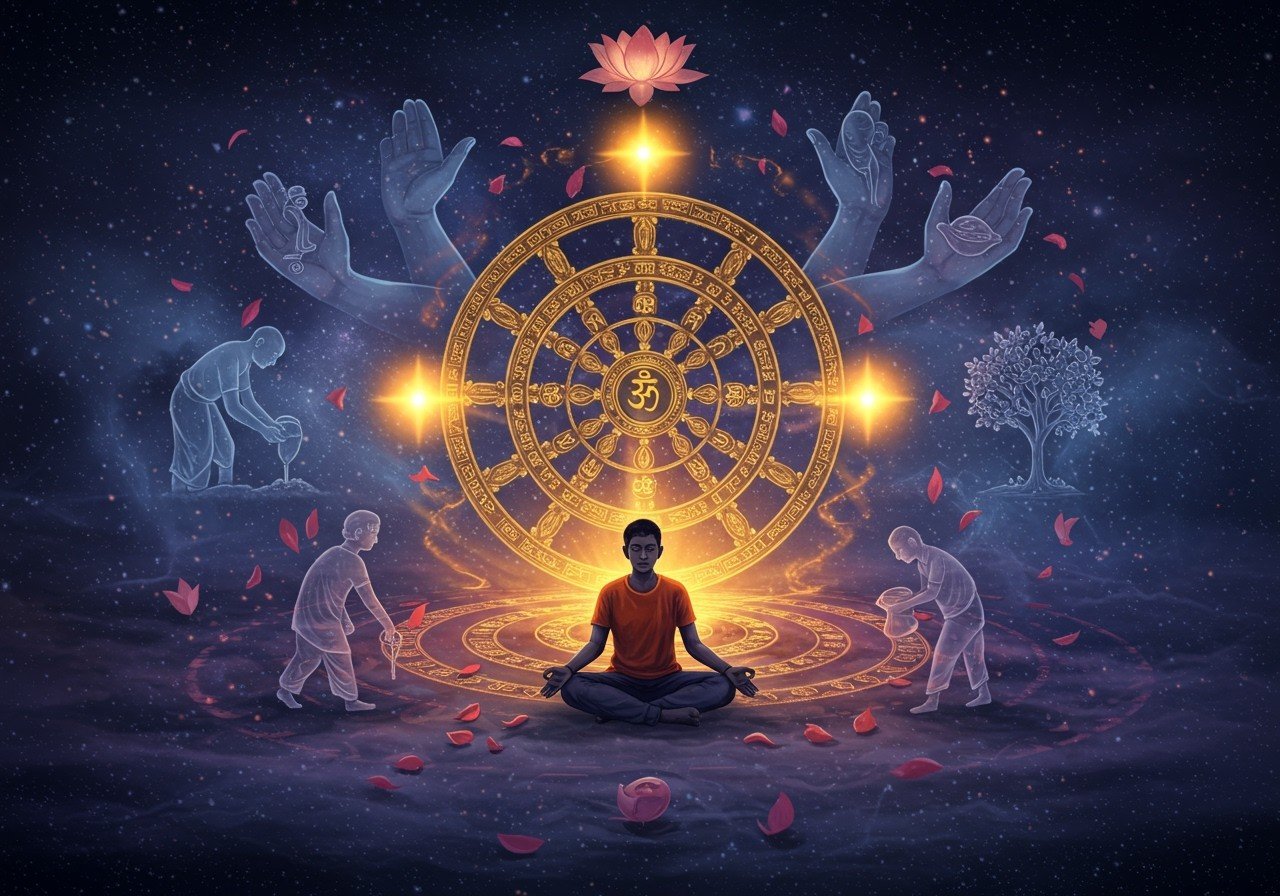Understanding Karma in 2025: A Modern Indian Perspective

In today’s India, amidst technological advancements and globalization, the age-old concept of karma continues to hold deep significance. This principle, originating from ancient Indian philosophy, emphasizes the interconnectedness of actions and their consequences. It shapes lives, influences decisions, and offers a framework for understanding the world around us. Let’s explore how modern Indians, embracing both tradition and contemporary lifestyles, interpret and apply karma in their daily lives.
Exploring the Essence of Karma
Karma, derived from the Sanskrit word for “action,” is the principle of cause and effect. It suggests that every action, whether physical, mental, or verbal, generates a corresponding reaction. Good intentions and deeds contribute to positive karma, while negative ones lead to adverse consequences. This understanding encourages mindful living, prompting individuals to consider the impact of their choices.
- Definition: Karma encompasses both the action itself and the intention behind it. A positive action with a selfish motive may not generate the same positive karma as a similar action performed with selfless intent. Conversely, a negative action performed unintentionally might have less severe karmic repercussions than one done deliberately.
- Cause and Effect: Karma operates on the fundamental principle that every action has a reaction. This principle is not confined to the present life; it extends across lifetimes, shaping future experiences based on past actions. This cyclical nature of karma encourages accountability and conscious decision-making.
Karma in Daily Life: A Contemporary View
Modern Indians integrate the principles of karma into their daily routines in various ways. From mindful decision-making to acts of selfless service, karma influences how they navigate relationships, pursue careers, and engage with their communities.
- Mindfulness and Intention: The understanding of karma promotes conscious living. Individuals strive to align their thoughts, words, and actions with positive intentions. This mindfulness extends to daily interactions, work ethics, and personal growth. It fosters a sense of responsibility for one’s actions and their impact on others.
- Acts of Service and Compassion: The concept of Karma Yoga, or selfless action, encourages individuals to serve others without expecting anything in return. By contributing to the well-being of the community, individuals generate positive karma and move closer to spiritual liberation (Moksha). This philosophy resonates strongly with modern Indians, many of whom actively participate in philanthropic activities and social service initiatives.
Karma and Well-being: A Holistic Perspective
The principles of karma are not merely philosophical; they have practical implications for mental and emotional well-being. Understanding karma can empower individuals to take control of their lives and cultivate a more positive outlook. It encourages self-reflection, personal growth, and the development of positive character traits.
- Accountability and Resilience: Karma promotes a sense of accountability for one’s actions. This understanding can be empowering, helping individuals learn from past mistakes and make better choices in the future. It also fosters resilience in the face of adversity, as challenges are viewed as opportunities for growth and karmic balance.
- Empathy and Compassion: The awareness of karma’s impact on others nurtures empathy and compassion. It encourages individuals to treat others with kindness and respect, recognizing the interconnectedness of all beings. This understanding contributes to building stronger relationships and fostering a sense of community.
At poojn.in, we offer a wide selection of products that can support your spiritual journey and help you integrate the principles of karma into your daily life. Explore our collection of incense sticks, spiritual statues, and sacred texts to enhance your spiritual practices.
The Three Types of Karma
Karma is often categorized into three types, each playing a unique role in shaping an individual’s experiences:
- Sanchita Karma: This is the accumulated karma from all past lives. It represents the storehouse of karmic seeds that have yet to sprout and manifest as experiences. While we may not be consciously aware of our Sanchita karma, it influences the circumstances we encounter in our present life.
- Prarabdha Karma: This is the portion of Sanchita karma that is currently unfolding in this lifetime. It determines the circumstances of our birth, our inherent tendencies, and the major life events we experience. Prarabdha karma is considered the fruit of past actions that we are currently reaping.
- Agami Karma: This refers to the karma we are creating through our present actions. It shapes our future experiences and contributes to our Sanchita karma. By making conscious choices and acting with positive intentions, we can cultivate positive Agami karma and influence our future in a beneficial way.
For further exploration of spiritual practices, you can find valuable resources on poojn.in, such as articles on ritual cleanliness and meditation for children.
Karma: Not Fate, but Choice
It’s crucial to understand that karma is not synonymous with fate or predestination. While our past actions influence our present circumstances, we retain free will and the ability to make choices that shape our future. Karma does not dictate a fixed path; rather, it provides a framework within which we exercise our free will. By understanding the principles of karma, we can make more conscious choices and create a more positive future for ourselves and others.
For a deeper understanding of karma, consider exploring our collection of books on the Bhagavad Gita and other spiritual texts at poojn.in. We offer a curated selection of resources to support your spiritual growth and understanding of karmic principles.


